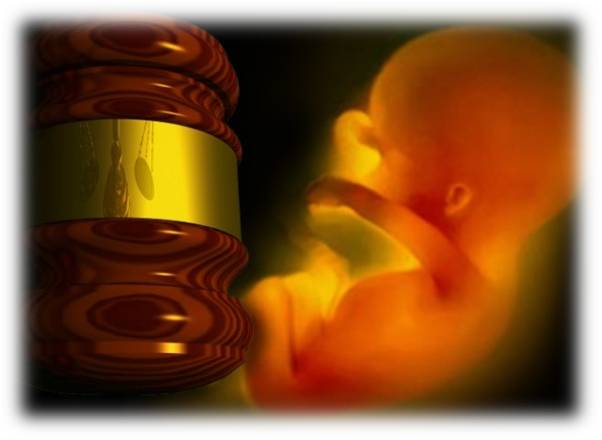The Texas Supreme Court unanimously ruled today that Texas can continue being the first state in America since 1973 to ban abortions.
For nearly six months, the law has banned most abortions in the state, saving thousands of unborn babies’ lives. Pro-abortion groups are challenging the law in multiple ways, but their most prominent lawsuit right now involves the unique private enforcement mechanism in the law.
The law bans abortions once an unborn baby’s heartbeat is detectable, about six weeks of pregnancy, but, unlike most pro-life laws, it leaves the enforcement up to private citizens, rather than state officials. Typically, when pro-abortion groups challenge pro-life laws, judges block the state from enforcing them.
With a ruling against Texas abortion businesses today, the state’s highest court effectively ruled that the heartbeat law can stay in place that bans abortions when babies have a detectable heartbeat at 6 weeks and allows private lawsuits against abortion practitioners and abortion businesses that break the law.
The Texas Supreme Court, in its ruling today, determined that state-agency executives cannot enforce Act. But enforcement by public officials was never the issue since the abortion ban allows a private right of against against the abortion industry for breaking the law.
Big Abortion essentially argued itself into a legal corner by saying it didn’t want state officials authorized to enforce the law because it would violate their so-called right to kill babies in aboritons, and the state’s highest court agree they could not since Roe v. Wade doesn’t allow states to publicly enforce abortion bans. In so doing, they allowed the courts to uphold the law and the private enforcement mechanism.
Follow LifeNews on the MeWe social media network for the latest pro-life news free from Facebook’s censorship!
Today’s ruling effectively ended a challenge by abortion centers — that have gone to the state and nation’s highest court in their desperate attempt to keep profiting from abortions.
Texas Right to Life Media Director Kimberlyn Schwartz responded to the good news: “This is a big victory for the TX Heartbeat Act! We have said from the beginning that abortionists’ lawsuit should be dismissed, and we’re grateful that the law will continue saving thousands of lives.”
During arguments before the court, State Solicitor General Judd Stone responded that the law clearly states that enforcement is private. Stone told the justices that there is no “ordinary English interpretation that entertains any possibility of public enforcement.”
Even abortion advocates knew that their case was legally hopeless.
Speaking with Politico in January, Center for Reproductive Rights attorney Marc Hearron described the situation as bleak after both the U.S. Supreme Court and the Fifth Circuit Court of Appeals refused to block the law.
“There’s a part of our case left against these licensing officials, and it’s an important part of the case, but people need to understand that even what’s left is being delayed and strung out while patients across Texas are denied their constitutional rights,” Hearron said.
In December, the Supreme Court left only part of the abortion groups’ lawsuit in place and sent the case back to the Fifth Circuit for consideration. It also threw out a second lawsuit by President Joe Biden‘s administration.
For nearly six months, the law has been stopping thousands of unborn babies from aborted killed in Texas. Late last year, abortion businesses estimate their abortion numbers are down as much as 80 percent and said they may be forced to close.
Last month, Texas Attorney General Ken Paxton provided an update on the Texas abortion ban today, and he confirmed the heartbeat law has saved 17,000 babies from abortions.
Paxton said the state’s ban on abortions after n unborn babies heartbeat can be detected at 6 weeks has saved “17,000 newborn lives” in the six months since the law went into effect. He said the pro-life law is responsible for a 60% decline in abortions.
“Simply by having SB8 enacted, thousands of lives have already been saved in Texas. Stopping abortion providers from conducting these barbaric practices is yet another win for our great state. I will continue to fight tirelessly for the rights of the unborn,” Paxton said in a statement LifeNews obtained.
“Abortions fell by 60 percent in Texas the first month after SB8 took effect. Abortion providers asked both the U.S. Supreme Court and the Fifth Circuit Court of Appeals to expedite their attack on the law by sending the case to a lower court, but they refused to do so,” Paxton added.
Texas SB8 is a pro-life law that bans abortions after six weeks of pregnancy, when fetal cardiac activity can be detected. Also known as the “Heartbeat Bill,” the law protects the unborn from gruesome medical procedures that involve dismemberment in the mother’s womb.
Texas also has been adding support services for pregnant and parenting families. Along with passing the heartbeat law in 2021, state lawmakers also increased support for programs that serve pregnant and parenting mothers and babies, ensuring that they have resources to choose life for their babies.
The heartbeat law has the potential to save tens of thousands of unborn babies from abortion every year. In 2020, about 54,000 unborn babies were aborted in Texas, and about 85 percent happened after six weeks of pregnancy, according to state health statistics.
And if the U.S. Supreme Court overturns Roe v. Wade later this summer, it is likely that even more southern states will ban abortions, leading to even more lives being saved.








